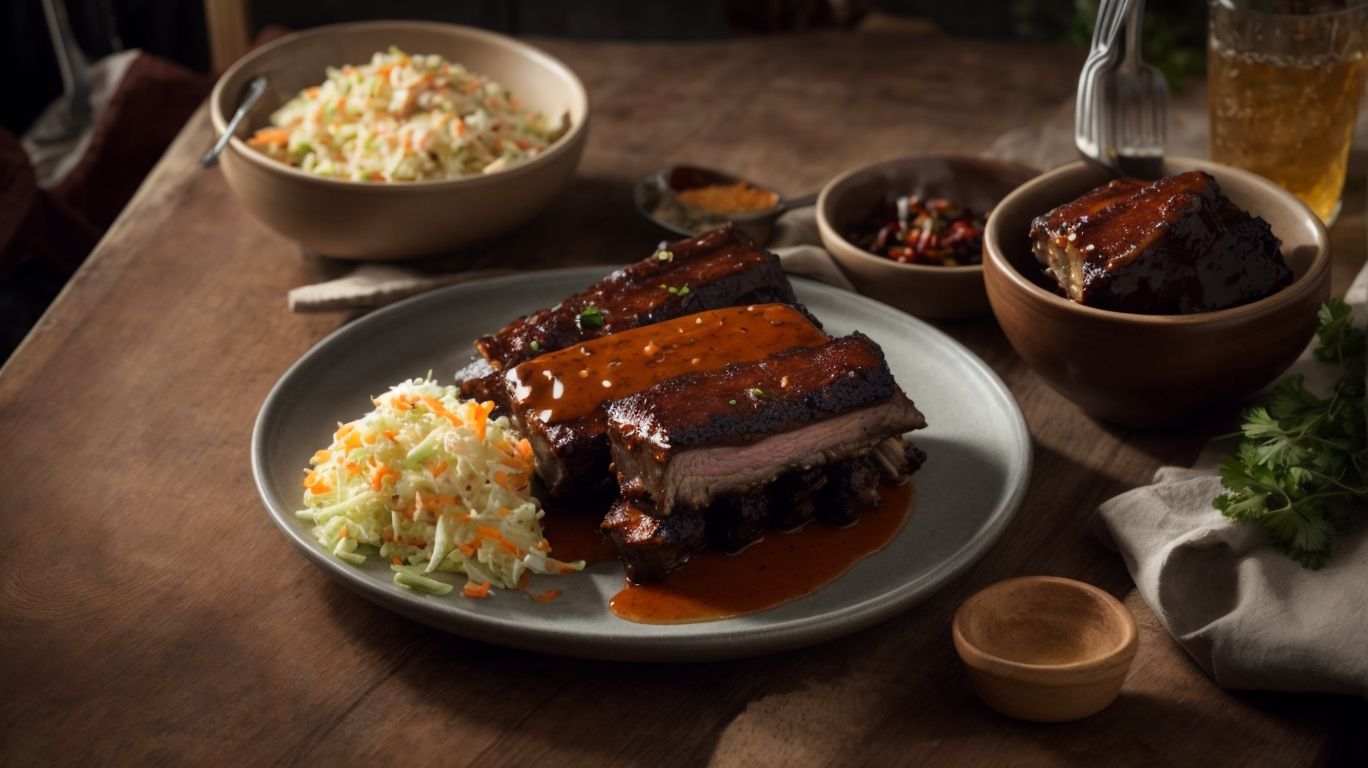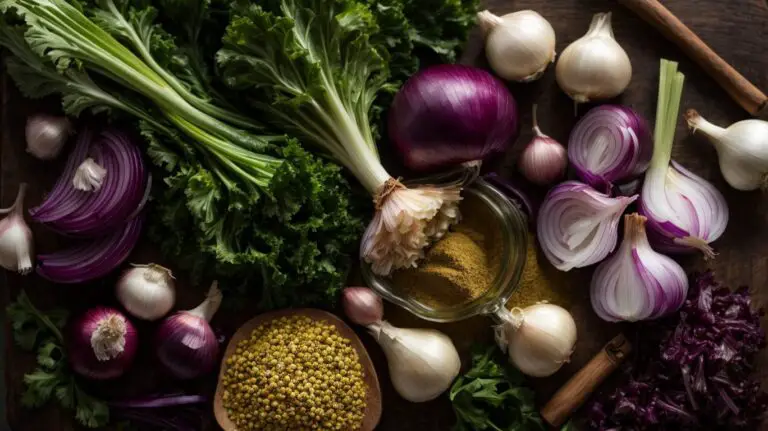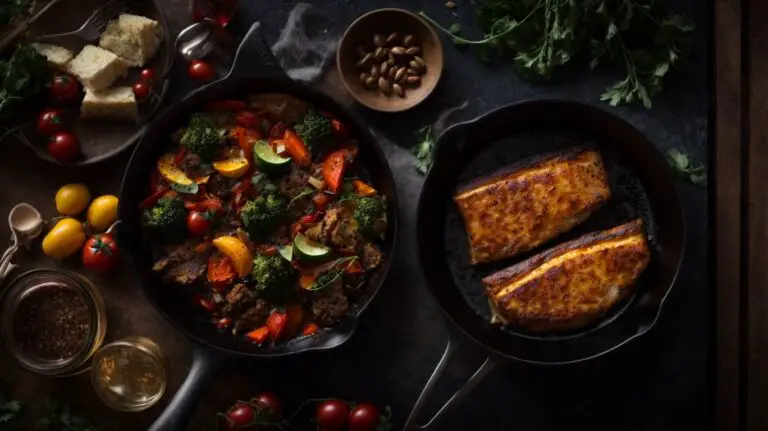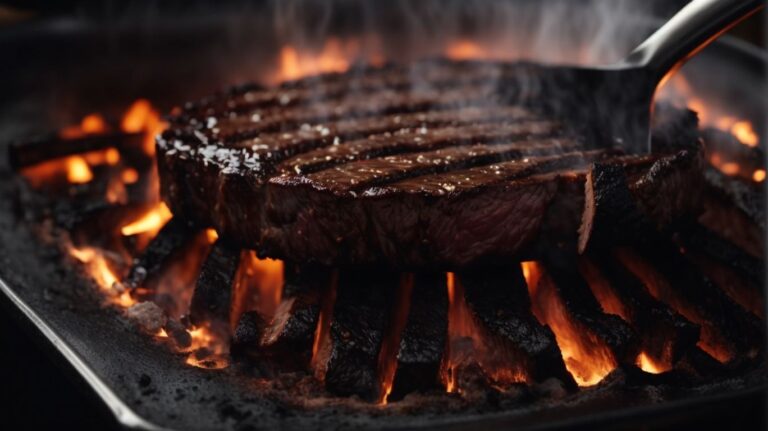How to Cook Ribs After Marinating?
Are you ready to take your rib game to the next level?
We explore the art of marinating ribs and why it is crucial for achieving mouth-watering flavor.
From discussing the purpose of marinating to exploring different types of marinades for ribs, we cover all the essentials.
Stay tuned for tips on how to marinate ribs, prepare them before cooking, and choose the best cooking method for delicious results.
Let’s get cooking and serve up some irresistible ribs!
Key Takeaways:
What is Marinating and Why is it Important?
Marinating is a culinary technique where meat, such as ribs, is soaked in a mixture of ingredients like herbs, spices, and liquids to enhance its flavor, tenderness, and juiciness. It plays a crucial role in infusing the meat with delicious flavors and ensuring a succulent texture when cooked.
When preparing a marinade for ribs, the choice of herbs like rosemary or thyme can add depth to the flavor profile, while spices such as paprika or cumin provide a hint of heat or smokiness. The liquids in a marinade, like sauces or citrus juices, not only tenderize the meat but also contribute to the overall taste. The combination of these elements in a well-balanced marinade can transform ordinary ribs into a mouthwatering dish.
What is the Purpose of Marinating?
The primary purpose of marinating ribs is to tenderize the meat, infuse it with flavors, and ensure that it remains juicy and flavorful during the cooking process. Marinating helps in breaking down tough muscle fibers, making the ribs more tender and succulent.
When marinating ribs, the process involves creating a flavorful concoction of ingredients that work together to penetrate the meat. The acidic components in the marinade, such as vinegar or citrus juices, help in breaking down collagen in the meat, further contributing to tenderizing the meat. The addition of herbs, spices, and oils not only impart a depth of flavor but also aid in trapping moisture within the ribs during cooking, preventing them from drying out.
What Types of Marinades Can You Use for Ribs?
There are various types of marinades that you can use for ribs, including BBQ marinades, dry rubs, and barbecue sauces. Each type offers a unique flavor profile and texture to the ribs, allowing for customization based on personal preferences.
BBQ marinades are typically bold and tangy, often containing a mix of spices, vinegar, and sometimes a touch of sweetness. These marinades add a rich, smoky flavor to the meat, perfect for those who enjoy a classic barbecue taste.
- Dry rubs, on the other hand, are a mixture of herbs, spices, and seasonings that are applied directly to the ribs without any liquid component. They create a flavorful crust on the meat when cooked, providing a savory and slightly textured coating.
- Barbecue sauces come in a variety of styles, from sweet and sticky to spicy and tangy, offering a more saucy and moist finish to the ribs. Some barbecue sauces are tomato-based, while others may be vinegar or mustard-based, catering to different flavor preferences.
How to Marinate Ribs?
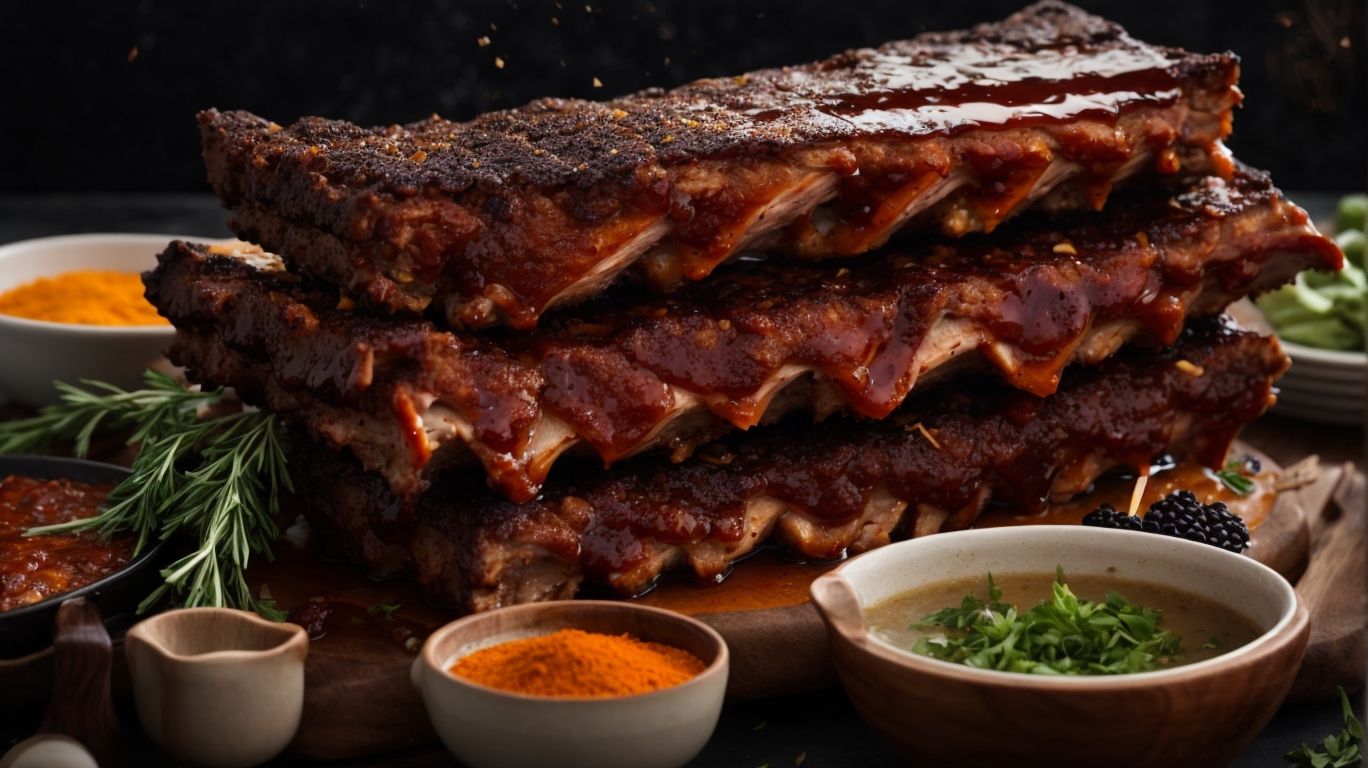
Credits: Poormet.Com – Andrew Lee
Marinating ribs involves preparing a flavorful mixture of ingredients like herbs, spices, and sauces, and immersing the ribs in this marinade for a specified period to enhance their taste and tenderness. The process requires careful consideration of flavors and marinating times to achieve optimal results.
When selecting ingredients for your marinade, choose a rub or a sauce that complements the meat’s natural flavors. Create a marinade by blending olive oil, minced garlic, soy sauce, brown sugar, and paprika for a savory touch. Ensure that the ribs are coated thoroughly with the marinade, allowing the flavors to penetrate the meat. Refrigerate the marinated ribs for at least 4 hours, but ideally overnight, to infuse the meat with the rich flavors. This step is essential for tenderizing the meat and enhancing its juiciness.
What Ingredients Do You Need for the Marinade?
For a delicious rib marinade, gather ingredients such as herbs, spices, oils, vinegar, and sweeteners like honey or molasses. These elements combine to create a flavorful mixture that will enhance the taste and texture of the ribs when marinated properly.
In terms of choosing herbs for your marinade, consider using fresh options like rosemary, thyme, or oregano for a fragrant and savory profile. Spices such as paprika, cumin, or garlic powder can add depth and complexity to the flavor profile.
- Experiment with different oils like olive oil, sesame oil, or avocado oil, as they not only infuse flavor but also help tenderize the meat.
| For a hint of acidity, opt for vinegar or citrus juices to balance the richness of the ribs. |
|---|
How Long Should You Marinate Ribs?
The ideal marinating time for ribs can vary depending on the recipe and desired flavor intensity.
Marinating not only enhances the taste but also plays a crucial role in tenderizing the meat, making it juicy and flavorful.
- For those top ribs, marinating overnight is often the preferred method as it allows the flavors to penetrate deeply.
- If you’re pressed for time, even a few hours of marination can yield noticeable results.
Tips for Preparing Ribs Before Marinating
Before marinating ribs, consider removing the membrane for better flavor penetration and scoring the meat to facilitate flavor absorption. These preparatory steps can significantly enhance the overall taste and tenderness of the ribs when marinated and cooked.
When removing the membrane, you allow the marinade to seep into the meat more effectively, resulting in a richer taste profile. Scoring the meat helps tenderize it further, contributing to a more succulent texture once cooked. By prepping your ribs in this way, you are setting the stage for a mouthwatering culinary experience that will impress your guests.
Should You Remove the Membrane?
Removing the membrane from ribs is recommended as it allows the marinade to penetrate the meat more effectively, resulting in better flavor absorption and tenderness. This step ensures that the ribs absorb the marinade’s flavors evenly during the marinating process.
By removing the membrane, you are essentially creating channels for the marinade to seep into the meat, infusing it with delicious flavors. The membrane, if left intact, acts as a barrier, hindering the absorption of the marinade and preventing the flavors from fully permeating the meat. This can result in uneven seasoning and a less flavorful end product.
How to Score the Meat for Better Flavor Absorption?
Scoring the meat involves making shallow cuts or incisions on the surface of the ribs to help the marinade seep into the meat, enhancing flavor absorption.
This technique ensures that the flavors permeate the meat evenly, leading to a more flavorful end result. By scoring the ribs, you create more surface area for the marinade to penetrate, resulting in a deeper flavor profile. Scoring also helps in tenderizing the meat by breaking down tough connective tissues, making the ribs juicier and more succulent.
Cooking Methods for Ribs After Marinating
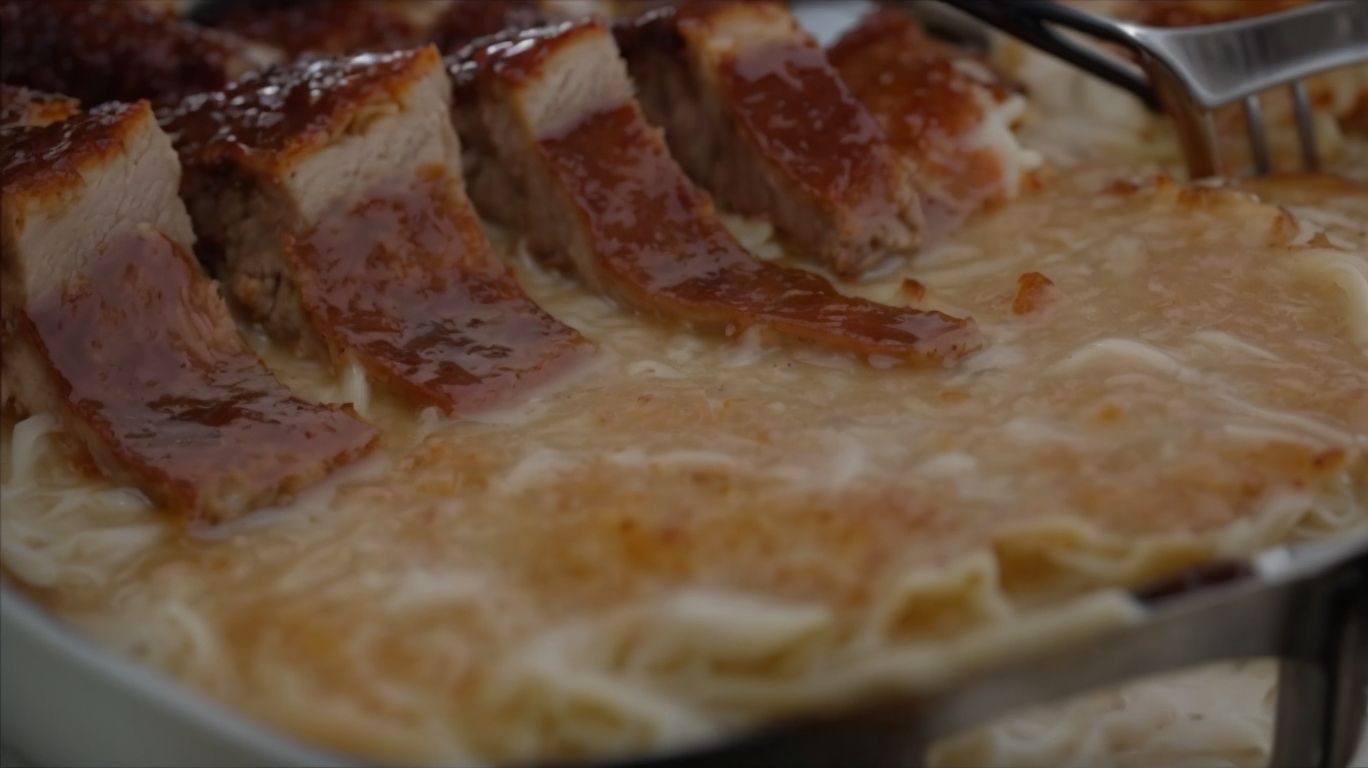
Credits: Poormet.Com – Jose Gonzalez
Once the ribs are marinated to perfection, you can explore various cooking methods such as grilling, baking, or smoking to achieve delicious and tender results. Each cooking technique offers a unique flavor profile and texture to the ribs.
Grilling the marinated ribs over an open flame imparts a smoky aroma and charred exterior, enhancing the overall flavor profile. The direct heat caramelizes the marinade, creating a slightly crisp texture on the outside while keeping the meat juicy inside. Grilling requires constant attention to prevent overcooking or burning the ribs.
Baking, on the other hand, offers a more hands-off approach to cooking ribs. By slowly roasting them in the oven, the marinade flavors penetrate deeply into the meat, resulting in a more tender and moist texture. The downside is that baking may lack the distinct smokiness that grilling or smoking provides.
Smoking the ribs involves slow-cooking them over low, indirect heat with wood chips to infuse a rich, smoky taste. This method results in exceptionally tender meat that falls off the bone, with a pronounced smoky flavor. The only drawback is the longer cooking time required, making it less convenient for quick meals.
Grilling Ribs
Grilling ribs over an open flame or BBQ imparts a smoky flavor and charred exterior, enhancing the overall taste and texture. Basting the ribs with barbecue sauce during grilling adds a sweet and tangy glaze to the meat, creating a mouthwatering dish.
To achieve that perfect smoky flavor, consider using a mix of charcoal and wood chips, such as hickory or applewood, in your grill.
Controlling the temperature is crucial; maintain a steady low heat for a slow cook that allows the flavors to develop fully. Don’t rush the process – the slow cooking time is what makes the meat tender and juicy.
In terms of choosing a BBQ sauce, opt for one that complements the flavors of the ribs. Whether you prefer a classic tomato-based sauce or a tangy vinegar BBQ sauce, make sure to generously coat the ribs for that signature BBQ taste.
Baking Ribs
Baking ribs in the oven is a convenient and efficient cooking method that allows the marinade to penetrate the meat slowly, resulting in tender and flavorful ribs. The oven’s controlled temperature ensures even cooking and proper flavor infusion.
For those looking to elevate their rib game, opting for the oven method can provide a delectable outcome. The slow penetration of the marinade through the meat fibers during baking helps in creating a depth of flavor that is truly irresistible. Not only does this method enhance the taste, but it also ensures that the ribs come out juicy and succulent.
Smoking Ribs
Smoking ribs is a traditional cooking method that imparts a rich, smoky flavor to the meat, enhancing its overall taste. The slow smoking process allows the marinade flavors to meld with the meat, creating a distinctive and mouthwatering dish.
In terms of achieving that perfect smoky flavor, the type of wood chips used plays a crucial role. Hickory wood chips are popular for their strong flavor profile, while fruitwoods like apple or cherry impart a sweeter taste to the ribs. It’s important to soak the wood chips in water before adding them to the smoker to ensure a slow release of smoke. The duration of smoking is key to developing the desired depth of flavor in the ribs. Low and slow is the mantra here, with some recipes calling for several hours of smoking to achieve that tender, smoky goodness.
How to Tell When Ribs are Cooked to Perfection?
Determining the ideal doneness of ribs involves assessing their tenderness, meat texture, and internal temperature. Cooked to perfection, ribs should be tender, juicy, and easily separated from the bone, ensuring a delightful eating experience.
One way to check the tenderness of ribs is by using the fork test. When the ribs are ready, a fork should easily pierce the meat with little resistance, indicating the desired tenderness. Visually, the meat should pull back slightly from the bone, showcasing its succulence. Internal temperature checkpoints can provide additional assurance; for pork ribs, aim for an internal temperature of 190°F (88°C) for fall-off-the-bone goodness.
Serving and Enjoying Your Delicious Ribs
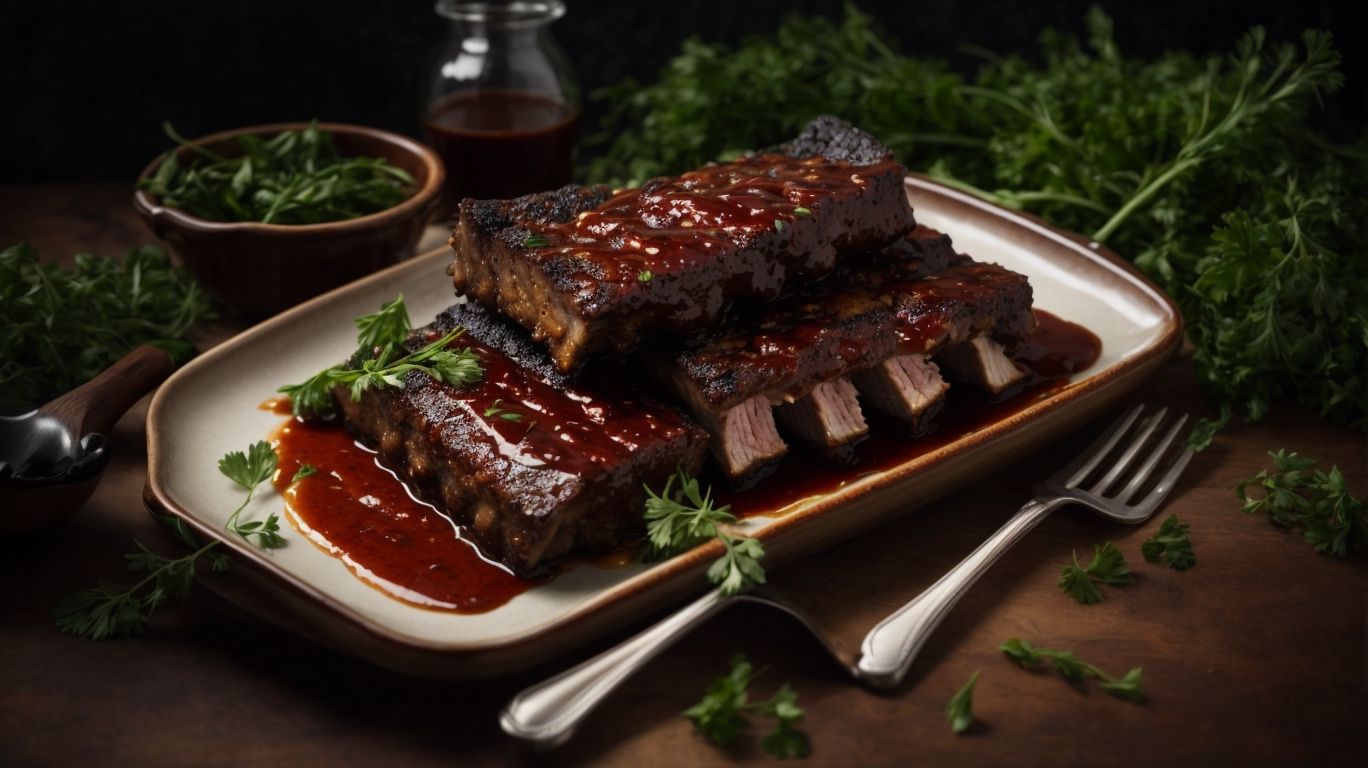
Credits: Poormet.Com – Gregory White
Once your delicious ribs are cooked to perfection, pair them with delectable sides like potato salad, coleslaw, or grilled vegetables, and serve them with a generous drizzle of your favorite BBQ sauce for a complete and satisfying meal.
When serving your flavorful ribs, consider creating a visually appealing plate by arranging the ribs in a neat stack or fanned out elegantly. The sides can be placed strategically to complement the rich flavors of the meat. For a rustic presentation, you can opt for a wooden platter or a classic white plate for a more sophisticated touch.
Remember that the BBQ sauce plays a crucial role in enhancing the overall taste experience. Choose a sauce that balances sweetness, tanginess, and smokiness to elevate the flavors of your dish. Whether you prefer a spicy kick or a more mellow taste, the BBQ sauce can truly make or break the dish.
Consider setting a small bowl of extra BBQ sauce on the side for dipping or drizzling to allow your guests to customize their flavor experience. This additional touch can add a fun interactive element to the meal and cater to varying preferences.
What Sides Go Well with Ribs?
Ribs pair exceptionally well with a variety of sides, including classic choices like potato salad, coleslaw, and grilled vegetables, each adding unique flavors and textures to the meal. Drizzling BBQ sauce over the ribs enhances the taste and provides a delightful contrast.
In terms of choosing the perfect side dish to accompany your succulent ribs, potato salad stands out with its creamy texture and tangy flavor. The combination of soft potatoes, crispy vegetables, and a zesty dressing creates a delightful balance to the smoky richness of the ribs.
On the other hand, coleslaw offers a refreshing crunch that cuts through the richness of the meat. The blend of shredded cabbage, carrots, and a creamy dressing lends a light and crisp contrast to the hearty ribs.
Grilled vegetables provide a healthy and vibrant option that perfectly complements the grilled meat. The charred flavor of vegetables like zucchini, bell peppers, and corn adds a smoky depth that harmonizes with the ribs’ robust taste.
The role of BBQ sauce should not be underestimated. Its sweet, tangy, or spicy notes can elevate the overall dining experience by adding a luscious glaze and enhancing the smokiness of the ribs. Whether slathered generously or used as a dipping sauce, BBQ sauce is a versatile condiment that ties the flavors together.
How to Cut and Serve Ribs?
When serving ribs, use a sharp knife to cut between the bones and portion them into individual servings. Present the ribs on a platter or plate, allowing guests to enjoy the succulent meat and flavors with ease and delight.
To ensure clean and precise cuts, it’s crucial to have a sharp knife that can effortlessly slice through the tender meat and separate the ribs. Proper cutting not only enhances the presentation but also makes it simpler for diners to enjoy the dish without struggling with tough portions. For an elegant touch, consider arranging the ribs in a visually appealing manner on the platter, perhaps alternating directions or garnishing with fresh herbs for a pop of color and flavor. The way you serve and present the ribs can elevate the dining experience and make the meal more memorable.
Frequently Asked Questions
1. How to Cook Ribs After Marinating?
To cook ribs after marinating, preheat your oven to 350 degrees Fahrenheit. Place the marinated ribs on a baking sheet and bake for 1 hour and 30 minutes, turning every 30 minutes. For a crispy finish, broil for an additional 5 minutes on each side.
2. Can I grill ribs after marinating?
Yes, you can grill ribs after marinating. Preheat your grill to medium-high heat and place the marinated ribs on the grill. Cook for 20-30 minutes, turning occasionally, until the internal temperature reaches 145 degrees Fahrenheit.
3. How long do you marinate ribs before cooking?
It’s best to marinate ribs for at least 4 hours before cooking, but you can marinate them for up to 24 hours for maximum flavor. Make sure to keep the ribs refrigerated during the marinating process.
4. Can I use leftover marinade for basting while cooking ribs?
No, it is not recommended to use leftover marinade for basting while cooking ribs. This can potentially introduce harmful bacteria from the raw meat. It’s best to make a separate basting sauce or reserve some of the marinade before adding the meat.
5. Should I remove excess marinade before cooking ribs?
Yes, it’s important to remove excess marinade before cooking ribs. Too much marinade can cause the ribs to become soggy and may also cause flare-ups on the grill. Simply shake off any excess marinade before cooking.
6. Can I marinate ribs overnight?
Yes, you can marinate ribs overnight for maximum flavor. However, make sure to refrigerate the ribs and the marinade during this time to prevent any bacterial growth. If marinating for longer than 24 hours, freeze the ribs and marinade until ready to use.

